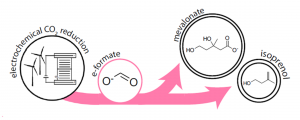The transition to a sustainable bioeconomy requires scalable alternatives to fossil-based production of fuels, chemicals, and materials. This work demonstrates a breakthrough in microbial bioproduction by engineering Escherichia coli to grow rapidly on renewable formate—an electrochemically derived, carbon-negative feedstock from CO₂.

By implementing a fast, metal-dependent formate dehydrogenase, combined with the reductive glycine pathway, we created the first synthetic E. coli formatotroph with growth rates comparable to the fastest natural organisms. This engineered platform enables high-titer bioproduction directly from CO₂-derived formate, achieving >3 g/L mevalonate, a key precursor for bioplastics, terpenoids, and sustainable aviation fuels.
Beyond electrochemical formate, the system valorizes abundant waste lignin, converting its formate-rich degradation products into valuable chemicals—expanding both sustainability and economic feasibility. This technology establishes a versatile, carbon-negative microbial chassis that couples renewable energy with precision fermentation, opening the door to scalable production of fuels, plastics, and specialty chemicals from waste carbon.
It positions formate-based bioproduction as a cornerstone for the next generation of climate-positive industrial biotechnology.
For the full paper access please click here: Link to Nature Communications
The b.fab team is delighted to have compiled this outstanding work in collaboration with worldwide leading institutes. We would like to express our gratitude for the excellent cooperation.
Graphical abstract was designed and provided by Aidan Cowan, UC Berkeley.
